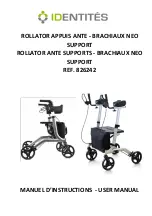
E
SQUOD_SU
06/2009
19
To adjust the depth of the "pelotten", you can loosen screws (2) and set the "pelotten" to the desired
depth.
L
Make sure that all screws are properly tightened after the assembly, otherwise the stability of
the "pelotten" is endangered, and this may cause injury and/or damage.
L
Make sure that the rail system is properly mounted and that nothing obstructs its functional
integrity.
L
If the wheelchair is not fully assembled when delivered, only your specialist dealer who has
suitable tools and knowledge of the fittings, may perform the mounting procedure.
L
Improper assembly leading to damage voids any warranty claim.
L
While the body supports are fitted, you should sit quietly and naturally in your wheelchair to
allow correct fitting.
L
Make sure that no objects and/or body parts are located between the "pelotten" and the back
of the "pelotten" when these are pulled tight, otherwise bruising and/or damage might occur.
If you have further questions about the indications and function of the "pelotten", kindly contact your
specialist dealer. He would gladly answer your questions.
FOR YOUR SAFETY
Some safety tips are given below for your security:
L
To prevent injury and/or damage to your wheelchair, make sure that no objects and/or body
parts are caught in the spokes of the driving wheels.
L
Do not step on the footplate when entering or leaving the wheelchair. The footplate should be
folded up beforehand.
L
You should investigate the effects of shifting the centre of gravity on the behaviour of the
wheelchair for example on gradients, on laterally sloping ground, or when overcoming
obstacles, only when a helper is present to secure and support you.
L
If you want to pick up something (lying in front of, on the side, or to the rear of the wheelchair),
you should not lean too far out to avoid tipping over because of the displacement of the centre
of gravity.
L
Only use your wheelchair according to regulations. Avoid for example driving without brakes
against an obstacle (step, edge of the curb) or driving down from ledges.
L
If devices and furnishings like ramps or lifts are available, use them.
L
Driving should only take place in the seated position. The drive program should not be used
during the standing/upright function. Reduced drive should be deployed only for altering
position during the standing/upright function.
L
Only carry out the standing/upright function under supervision from another person, as the risk
of tipping increases when weight shifts in the wheelchair.
L
The standing/upright function should only be used if the chest belt and leg/knee protector are
properly attached and deployed.
L
Check that the profile depth of the tyres is adequate.
L
Obey traffic regulations when driving on public roads.
L
When driving your wheelchair, you should not be under the influence of alcohol or medicine as
in the case of driving other vehicles. This also applies to indoor driving.
L
When travelling outdoors, adapt your driving to weather and traffic conditions.
L
Check that the rear reflectors of your wheelchair are not covered by dirt and/or other objects.
L
When driving in the dark, wear bright clothing to be more visible, or clothing with reflectors,
and make sure that the reflectors of the wheelchair are clearly visible.
L
Be careful when using sources of fire such as cigarettes, since they can set the seat and back
covers alight.
















































